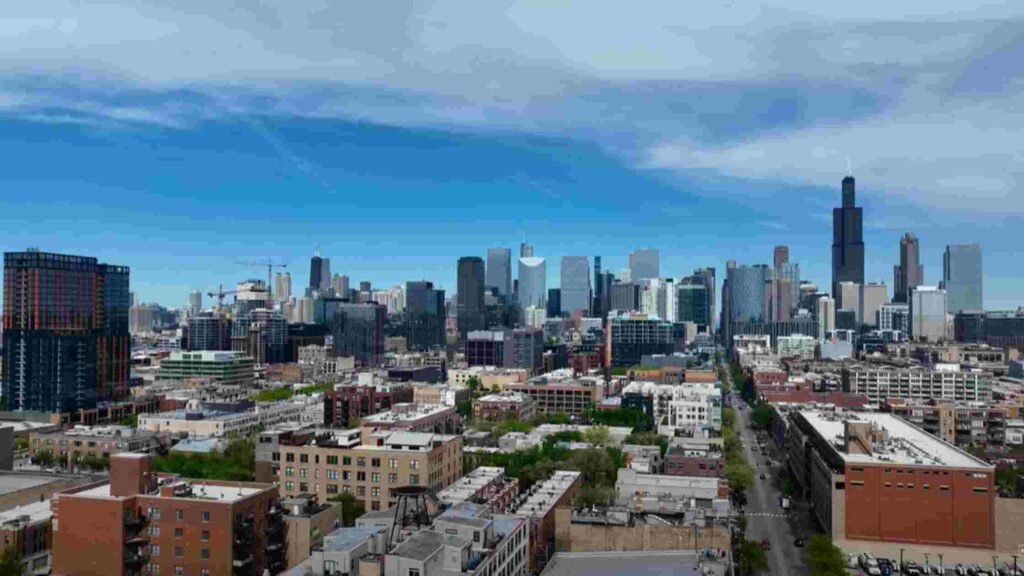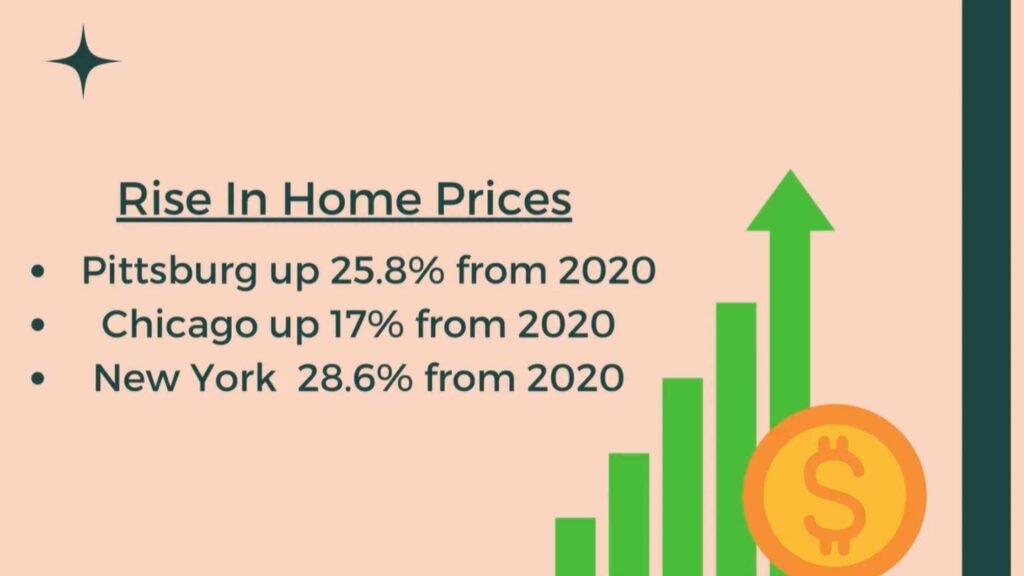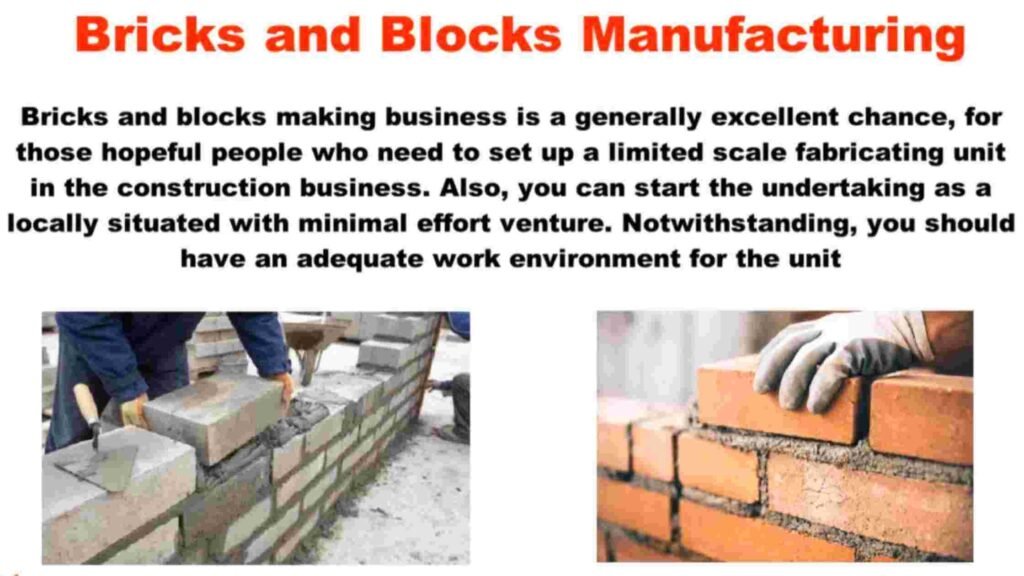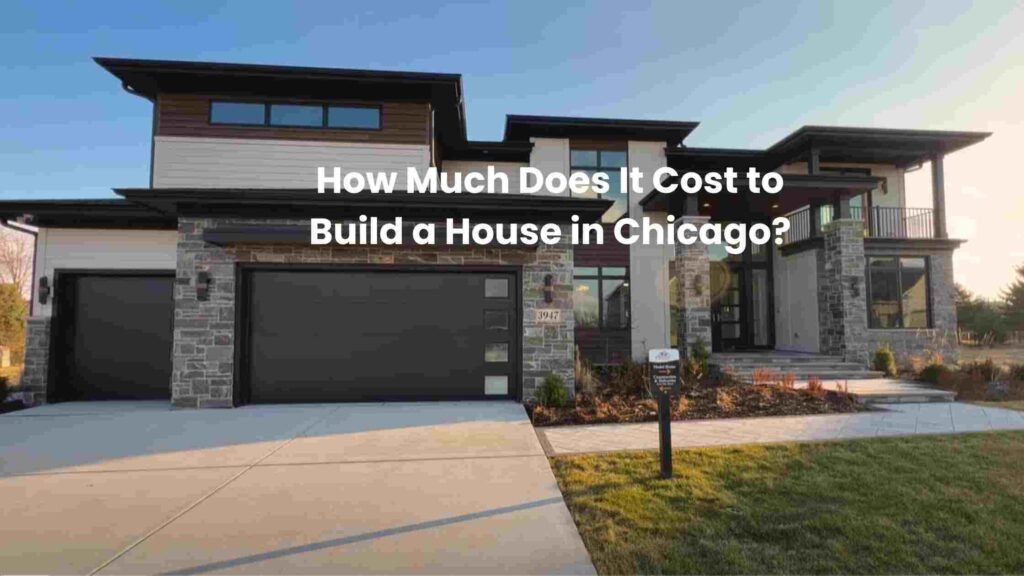The Cost to Build a House Chicago A house in Chicago typically costs between $200 and $500 per square foot. Final expenses depend on various factors such as materials and location.
Understanding the costs associated with constructing a new home in Chicago is key for anyone considering taking on such a project. The Windy City’s diverse neighborhoods offer a range of prices and styles, promoting to different preferences and budgets.
Your choice of finishes and the complexity of the design can drive costs higher while opting for a simpler layout in a more affordable area can keep them lower.
Engaging with experienced local contractors provides insights into how you can balance your desires with your budget, ensuring that you make the most of your investment in your new Chicago home.
Remember that land purchase, permits, and architectural services also contribute to the overall cost, so keep these in mind when planning your build.
Setting The Scene In Chicago Real Estate

Imagine the bustling streets, towering skyscrapers, and neighborhoods soaked in history. Chicago’s real estate market reflects its vibrant culture and dynamic lifestyle. With the city’s robust infrastructure, top schools, and a rich tapestry of neighborhoods, it’s no wonder that building a home here is an attractive idea for many. The costs involved in such a venture, however, are influenced by a myriad of factors that aspiring homeowners should consider carefully.
The Appeal Of Building A Home In Chicago
- Cultural Richness: Museums, theaters, and galleries at your doorstep.
- Diverse Neighborhoods: From the historic charm of Gold Coast to the artsy vibe of Wicker Park.
- Economic Opportunities: A hub for industries offering robust job prospects.
- Accessibility: Extensive public transportation makes navigating the city a breeze.
Key Factors Influencing Construction Costs
Every build in the Windy City is unique, with costs that can flutter and surge like the unpredictable Chicago breeze. A blend of critical elements determines the final price tag of your dream home:
| Factor | Impact on Cost |
|---|---|
| Location: | Land prices vary significantly across neighborhoods. |
| Materials: | Skilled labor in Chicago has its premium price. |
| Design: | Custom designs often come with higher costs. |
| Labor: | Skilled labor in Chicago has its own premium price. |
| Permits & Fees: | City regulations and fees add to the overall cost. |
| Size & Complexity: | Larger, more complex builds require more resources. |
Breaking Down Construction Costs
Are you excited to build your dream home in Chicago? Understanding construction costs is key. Let’s break down the numbers!
Average Cost Per Square Foot
The price to build a house in Chicago often starts with a basic figure: the cost per square foot. This number can tell you a lot about your future expenses. In Chicago, you might expect to spend anywhere from $200 to $500 per square foot. Why such a big range? Materials, designs, and finishes can differ a lot!
Price Variances By Neighborhood
Location matters! Each Chicago neighborhood can affect building costs. In places like Lincoln Park or the Gold Coast, prices can be higher. Other areas like Logan Square or Avondale may offer more affordable options. Here’s a quick look at the landscape:
- Luxury neighborhoods: $400 to $500+ per square foot
- Middle-class areas: $250 to $400 per square foot
- Emerging neighborhoods: $200 to $300 per square foot
Custom Home Vs. Pre-built Options
Choosing between a custom home and a pre-built model is big. A custom home allows you to handpick every detail. Prices for custom builds are usually higher, as you’re paying for a tailor-made experience. Pre-built homes, on the other hand, offer faster move-in times and lower costs.
| Home Type | Average Cost |
|---|---|
| Custom Home | $200 to $500 per square foot |
| Pre-built Home | $100 to $300 per square foot |
Land Acquisition Expenses

Starting on the journey to build a house in Chicago begins with a key step: land acquisition. Understanding the expenses involved in acquiring a plot can set a solid foundation for your budgeting. Here, we explore the costs of vacant lots and the associated legal fees and closing costs.
Cost Of Vacant Lots
The price tag for a piece of Chicago land depends on various factors. Location, size, and zoning regulations play pivotal roles in determining cost. The area’s demand also impacts prices. As of our latest data:
- Prime neighborhoods: Expect higher prices.
- Developing areas: Find more affordable options.
A common range for vacant lots in Chicago stretches from $50,000 to over $1 million. Rare opportunities in coveted locations may demand premiums well above these figures.
Legal Fees And Closing Costs
Legalities ensure the transfer of land is legitimate. Attorneys’ expertise comes at a cost, typically involving :
- Title searches to confirm ownership rights
- Contract reviews to secure your interests
Meanwhile, closing costs encompass a wide range of expenses:
| Expense | Typical Range ($) |
|---|---|
| Legal fees | 1,500 – 5,000 |
| Inspections | 300 – 500 |
| Appraisals | 300 – 600 |
| Transfer taxes & stamps | Varies based on the sale price |
Total closing costs typically account for 2-5% of the land purchase price. This includes recording fees, stamps, and any additional processing charges.
Architectural Design And Planning Fees
Building a house in Chicago starts with a dream and a design. Understanding architectural design and planning fees is key. These costs vary widely. They depend on the project size and complexity. Let’s break down the costs you’ll encounter.
Hiring An Architect In Chicago
Architects turn vision into blueprints. They are essential for a well-built home. In Chicago, their fees can be structured in several ways:
- Percentage of construction cost: Typically ranges from 8% to 15%.
- Flat fee: Good for smaller projects or well-defined scopes.
- Per square foot: Can range from $2 to $10 per square foot.
- Hourly rate: Varies based on experience and reputation, usually $150 to $500 per hour.
Planning And Permit Costs
After hiring an architect, the next step is planning. You need permits for legal construction. In Chicago, permit costs vary due to several factors.
| Type of Permit | Cost |
|---|---|
| Standard Plan Review | Varies by scope; use the City permit fee calculator (minimum permit fee $302) |
| Easy Permit Process | Varies by scope; subject to the same fee schedule (minimum $302) |
Other planning costs may include:
- Surveyor fees
- City fees and contributions
- Water and sewer access charges
Each step ensures safety and legality. It’s vital to factor these into your budget. For current permit fees, consult the City of Chicago’s calculator for permits issued in 2025.
Building Materials And Supplies

Thinking of building a house in Chicago? Material and supply costs can shape your budget. Here’s what you need to know:
Standard Material Costs
Chicago homes have standard materials that fit most budgets. costs fluctuate based on market conditions. Here’s an overview:
- Lumber: Essential for frames and structures.
- Concrete: Needed for foundations and basements.
- Drywall: Covers interior walls and ceilings.
- Insulation: Keeps your home warm and energy-efficient.
- Rooftop materials: Shingles or tiles protect from weather.
Expect a table below for a quick cost guide:
| Material | Cost Range |
|---|---|
| Lumber | $5 – $10 per square foot |
| Concrete | $100 – $150 per cubic yard |
| Drywall | $1.50 – $3.00 per square foot |
| Insulation | $0.30 – $1.50 per square foot |
| Rooftop materials | $100 – $1,000 per square |
High-end Finishes And Fixtures
High-end homes use premium materials. They give unique looks and last longer. Consider these upscale options:
- Hardwood flooring: Elegant and durable.
- Granite countertops: Adds luxury to kitchens.
- Custom cabinets: Unique storage designs.
- High-tech plumbing fixtures: Modern and efficient.
- Designer lighting: Stylish and functional.
All these high-end finishes elevate your home’s value. They do cost more. See examples below:
| Finish/Fixture | Cost Range |
|---|---|
| Hardwood flooring | $8 – $15 per square foot |
| Granite countertops | $40 – $100 per square foot |
| Custom cabinets | $500 – $1,200 per linear foot |
| High-tech plumbing | $150 – $500 per fixture |
| Designer lighting | $200 – $2,000+ per fixture |
Labor Costs In The Windy City
Building a house in Chicago is exciting. Understanding labor costs is key. These costs can shift. They depend on the work needed. Skilled workers demand higher pay.
Skilled Labor Pricing
Skilled labor is expensive. The demand is high. Carpenters, electricians, and plumbers set their rates. On average, expect to pay:
- Carpenters: $70 – $120 per hour
- Electricians: $100 – $150 per hour
- Plumbers: $90 – $200 per hour
These rates may vary. Factors like experience and project complexity matter.
Managing Contractors And Subcontractors
Working with contractors requires planning. They manage the job site. They also hire subcontractors. This layer adds to the overall cost.
A general contractor might charge:
| Service | Cost |
|---|---|
| Overhead | 10-20% of the total cost |
| Profit | 10-20% of the total cost |
Managing subcontractors is crucial. It ensures quality. It keeps the project on schedule. Remember, a well-managed team is worth the investment.
Additional Expenses To Consider
Building a house in Chicago brings a mix of excitement and careful budgeting. Beyond the primary construction costs, several additional expenses feature in the overall budget. A smart builder always plans for these. Let’s dive into some of these costs.
Insurance During Construction
Protecting your investment is vital. An unforeseen event can lead to costly setbacks. Construction insurance helps safeguard against these risks. This insurance covers theft, vandalism, and natural disasters. It is a must-have safety net for your Chicago home-building journey.
Property Taxes And Utilities
Even before move-in day, property taxes start ticking. The cost of these taxes varies based on property size and location. Don’t overlook them while planning your budget. Furthermore, setting up utilities is essential. Water, electricity, and gas need a connection even during construction. This ensures workers have the necessary resources to build your house efficiently.
| Expense Type | Description | Considerations |
|---|---|---|
| Building Insurance | Coverage for construction phase. | Get a policy that covers all potential risks. |
| Property Taxes | Local authority charges on your property. | Check with local authorities for exact rates. |
| Utilities Setup | Basic services like water and power. | Arrange for these early to avoid delays. |
- Builders’ Risk Insurance: Essential for protecting the construction site.
- General Liability Insurance: Shields against third-party claims.
- Workers’ Compensation: Mandatory if hiring employees.
Insurance, taxes, and utilities provide a foundation for a smooth construction process. Overlooking these costs can lead to unpleasant surprises. Diligent planning ensures your Chicago home construction stays on track both financially and time-wise.
Navigating Chicago Building Regulations
Building a house in Chicago is an exciting venture. You must understand local regulations to ensure a seamless process. Let’s explore zoning laws and codes that shape your future home.
Zoning Laws And Building Codes
Chicago’s zoning laws guide where and what you can build. These rules affect your project’s size, height, and use. It’s crucial to review the zoning ordinance before purchasing land.
- Residential zones control housing types.
- Commercial zones affect businesses and shops.
- Industrial zones are for factories and warehouses.
Building codes ensure safety. They cover structural integrity, electrical systems, and plumbing. Non-compliance leads to costly revisions. Always work with a knowledgeable architect.
Environmental And Historical Considerations
Chicago values its natural and historical landmarks. New construction must respect these. The Department of Planning and Development reviews plans near landmarks. Adhere to their guidelines for a smooth approval process.
Environmental regulations aim to protect local ecosystems. This includes managing stormwater and reducing energy consumption. Incorporating green solutions can offer long-term savings.
| Consideration | Details |
|---|---|
| Historical Landmarks | Obtain special permits for nearby construction. |
| Environmental Impact | Comply with sustainable building practices. |
The Hidden Costs
Planning to build a dream house in Chicago? Before you do, it’s crucial to understand not just the visible tags but also the hidden costs that come along. Often overshadowed by the excitement of construction, these expenses can sneak up on you. Let’s take a closer look at what you might not be seeing upfront.
Contingency Budgeting
Surprises happen, even with the best plans. A savvy move, creating a contingency fund, ensures you’re ready. Think of it as a safety net. Typically, set aside about 10-15% of your total budget. This can cover unforeseen costs like:
- Price hikes in materials
- Changes in project scope
- Weather-related delays or damage
Delay-induced Costs
Time is money, especially in construction. Delays can mean paying more than just wages. Factor in these potential costs:
| Delay Factor | Possible Extra Cost |
|---|---|
| Weather | Project stalling, safeguarding site/materials |
| Permit Approvals | Slowed starts, extended rental periods |
| Contractor Schedules | Overlapping jobs, increased labor rates |
To manage these costs, plan meticulously and choose reputable contractors. Keeping a flexible timeline can also help buffer against the financial strain of delays.
Financing Your Home Build
Financing Your Home Build is a critical step in bringing your dream house in Chicago to reality. Before the foundation gets laid, you need to understand the financial tools at your disposal. Whether you’re navigating construction loans or exploring grants, having a solid plan can ease the complex process of funding your new home build. Let’s dive into the options that can help turn your blueprint into a brick-and-mortar abode.
Construction Loans And Mortgages
Building a house in Chicago often starts with securing a construction loan. This temporary financing covers the building phase. Upon completion, it usually converts to a traditional mortgage. Key features of construction loans include:
- Interest-only payments during construction
- Conversion to a regular mortgage after the building finishes
- Terms and rates based on credit score and down payment
Understanding the terms and conditions of these loans is essential. Shop around for the best deals. Some local banks and credit unions offer competitive rates for Chicago residents. Remember, a bigger down payment can lead to lower interest rates. Here’s a simple representation:
| Down Payment | Interest Rate |
|---|---|
| 5-10% | Higher |
| 10-20% | Medium |
| 20%+ | Lower |
Grants And Incentives For Chicago Residents
The City of Chicago provides various grants and incentives to encourage home building. Eligible residents can significantly reduce their expenses. Some options include:
- Homebuyer assistance programs for first-time buyers
- Energy-efficient grants for sustainable building
- Tax rebates for certain neighborhoods
Researching local programs is crucial. Many are designed to promote community growth. They can lower initial costs. For instance, the Chicago Home Buyer Assistance Program helps with down payments. It’s a boon for many aspiring homeowners. Reach out to the local housing department and check their websites for the latest information.
In conclusion, finance your dream Chicago home wisely. Weigh every option. Prepare a solid financial plan. Secure the best terms you can. Your future home awaits!
The Time Factor
Building a house in Chicago involves more than just cost. The time it takes can affect your budget too. Construction timelines vary greatly, and knowing them helps plan better. How long it takes to build your dream home can depend on design, permitting, and construction factors.
Project Timeline
Understanding the timeline is crucial. The average time to build a house in Chicago is 6 to 12 months. Let’s break this down:
- Design and Pre-Construction: 1-2 months
- Permitting: 1-3 months
- Construction: 4-8 months
- Finalization: 1 month
| Phase | Time Required |
|---|---|
| Design and Pre-Construction | 1-2 Months |
| Permitting | 1-3 Months |
| Construction | 4-8 Months |
| Finalization | 1 Month |
Speeding Up The Building Process
Want to move in sooner? Certain steps can accelerate construction. These include:
- Efficient design choices: Simple layouts reduce complexity.
- Prefabricated materials: They are ready to install.
- Experienced contractors: They know how to avoid delays.
- Off-season building: Winter might be slower for permits.
Remember, rushing can increase costs. Balance speed with budget and quality.
Final Thoughts On Home Construction
As we wrap up our discussion on building a house in Chicago, it’s essential to weigh every aspect carefully. Home construction is a significant investment in time, money, and effort. Your final decision must align with both your current needs and plans.
Is Building Right For You?
Deciding whether to build a home in Chicago is a big choice. Understand your readiness to take on what can be a complex process:
- Customization: The building offers personalization down to the last detail.
- Time: Construction projects can exceed timelines due to various factors.
- Budget: Prepare for unexpected expenses beyond initial quotes.
Long-term Value Considerations
Building a house in Chicago is more than just upfront costs. Think about the following:
| Aspect | Benefit |
|---|---|
| Energy Efficiency | Lower utility bills with modern building standards |
| Resale Value | Custom homes can attract higher market prices |
| Maintenance | Reduced repairs with new construction materials |
Evaluate the longevity and potential return on your investment. A new, well-built home can provide security and comfort for years to come.
Frequently Asked Questions How Much Does It Cost to Build a House Chicago?
How Much Does It Cost To Build A 2000 Sq Ft House In Illinois?
The cost to build a 2000 sq ft house in Illinois ranges from $200,000 to $400,000, depending on materials and labor costs.
Is It Cheaper To Build A House Or Buy A Built House?
Typically, buying a house is more expensive than building one. Costs vary based on location, materials, and design choices. Choosing to build can offer customization but may involve unpredictability with time and expenses.
Is $ 200,000 Enough To Build A House?
Building a house for $200,000 depends on location, size, and materials. In some areas, this budget may suffice, while in others, it might fall short. Always research local costs before planning.
How Much Do You Expect A 3,000 Square Foot House To Cost?
The cost of a 3,000-square-foot house varies widely, typically ranging from $300,000 to $600,000, depending on location, materials, and design.
Conclusion
Building a home in Chicago can be an investment with a wide cost range. Factors like location, materials, and size play crucial roles in the final expense. By understanding these elements, future homeowners can budget effectively for their dream Chicago abode.
Start planning your build today to bring your vision to life.


